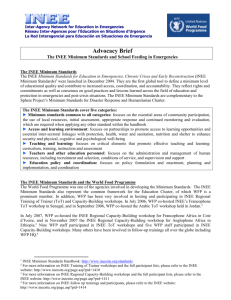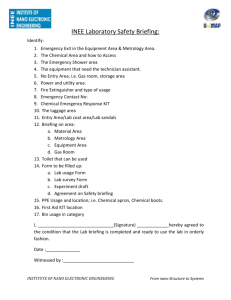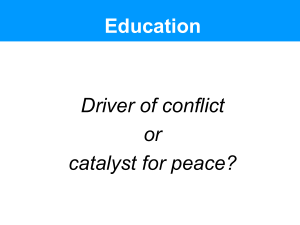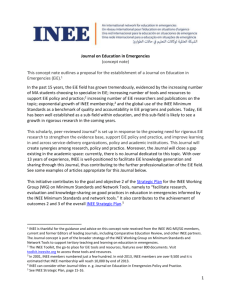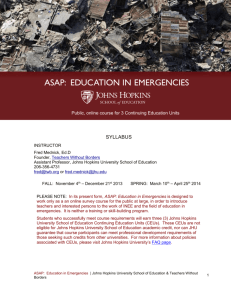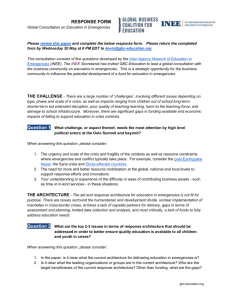About Efficiency Regulation
advertisement
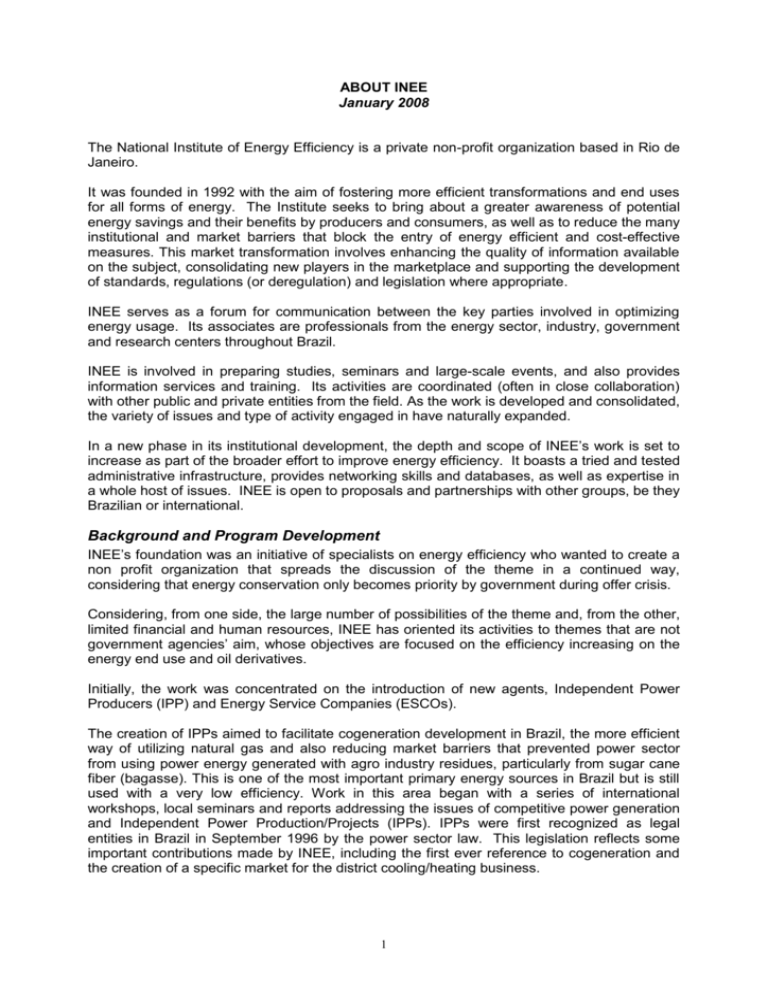
ABOUT INEE January 2008 The National Institute of Energy Efficiency is a private non-profit organization based in Rio de Janeiro. It was founded in 1992 with the aim of fostering more efficient transformations and end uses for all forms of energy. The Institute seeks to bring about a greater awareness of potential energy savings and their benefits by producers and consumers, as well as to reduce the many institutional and market barriers that block the entry of energy efficient and cost-effective measures. This market transformation involves enhancing the quality of information available on the subject, consolidating new players in the marketplace and supporting the development of standards, regulations (or deregulation) and legislation where appropriate. INEE serves as a forum for communication between the key parties involved in optimizing energy usage. Its associates are professionals from the energy sector, industry, government and research centers throughout Brazil. INEE is involved in preparing studies, seminars and large-scale events, and also provides information services and training. Its activities are coordinated (often in close collaboration) with other public and private entities from the field. As the work is developed and consolidated, the variety of issues and type of activity engaged in have naturally expanded. In a new phase in its institutional development, the depth and scope of INEE’s work is set to increase as part of the broader effort to improve energy efficiency. It boasts a tried and tested administrative infrastructure, provides networking skills and databases, as well as expertise in a whole host of issues. INEE is open to proposals and partnerships with other groups, be they Brazilian or international. Background and Program Development INEE’s foundation was an initiative of specialists on energy efficiency who wanted to create a non profit organization that spreads the discussion of the theme in a continued way, considering that energy conservation only becomes priority by government during offer crisis. Considering, from one side, the large number of possibilities of the theme and, from the other, limited financial and human resources, INEE has oriented its activities to themes that are not government agencies’ aim, whose objectives are focused on the efficiency increasing on the energy end use and oil derivatives. Initially, the work was concentrated on the introduction of new agents, Independent Power Producers (IPP) and Energy Service Companies (ESCOs). The creation of IPPs aimed to facilitate cogeneration development in Brazil, the more efficient way of utilizing natural gas and also reducing market barriers that prevented power sector from using power energy generated with agro industry residues, particularly from sugar cane fiber (bagasse). This is one of the most important primary energy sources in Brazil but is still used with a very low efficiency. Work in this area began with a series of international workshops, local seminars and reports addressing the issues of competitive power generation and Independent Power Production/Projects (IPPs). IPPs were first recognized as legal entities in Brazil in September 1996 by the power sector law. This legislation reflects some important contributions made by INEE, including the first ever reference to cogeneration and the creation of a specific market for the district cooling/heating business. 1 INEE also promoted many initiatives in order to divulge the Energy Service Companies (ESCOs), whose goal is optimizing consumer’s energy end-use, paying themselves through energy savings obtained. The theme was discussed trying to adapt the international experience to Brazilian legal and fiscal reality. Many ESCOs investors, nowadays set in Brazil, began their activities after participating on events promoted by INEE. After ABESCO (Brazilian Association of ESCOs) creation, INEE activities related to the theme were considerably reduced. During last years, INEE’s goals have been concentrated on three main subjects: efficiency minimal rate implementation; accelerating electric drive vehicles (EV) development and broadening and implementing distributed generation. About Efficiency Regulation Up to the crisis of 2001, government was not worried about efficiency minimal rates norms. This crisis stimulated the creation of standards. The Federal Law 10.295 / 01 determined that Ministry of Mines and Energy (MME) should define these energy efficiency minimal rates. This Law demands specific norms applicable to equipment. INEE understands that this work must be prioritized, so having until 2006 its Board of Directors President as a participant on the Inter-ministerial Commission (CGIEE) in charge of this development. The first important action of this Committee was the elaboration of the Inter-ministerial Regulation 553/05, which defined the Energy Efficiency Goals Plan for Electrical Three Phase Motors, equipment responsible for approximately 30% of overall electricity consumption in Brazil. In June 2006 was signed the Inter-ministerial Regulation 132/06, that defined efficiency minimal rates for Compact Fluorescents Lamps (CFLs). In December 2007 were signed the Inter-ministerial Regulations 362/07, 363/07 and 364/07, which defined specific rules for refrigerators and freezers, stoves and gas ovens and air conditioning equipment, respectively. About Distributed Generation (GD) The work for the increasing of the electric generation near the consumer (DG) reinforces INEE goals of raising energy production originated on cogeneration and sugar cane residues and of reducing transmission losses that consume up to 15% of overall electric energy produced in Brazil. From a series of international workshops, local seminars and reports addressing GD, INEE’s contribution can be found on Federal Law 10.848 / 04 and Decree 5.163 / 04 which established new model for electric sector and introduced rules that made DG development viable. INEE also participated of World Alliance for Decentralized Energy – WADE, having representation on its Board of Directors for two years. On October 1 and 2, 2003, the 4° International Seminar on Distributed Generation was held in Rio de Janeiro in partnership with WADE. INEE also launched, in October 2003, the PortalGD, in partnership with CanalEnergia, an important online journal that divulged during two years, technical and institutional editorials, articles, opinions, interviews and news of great importance for influencing specialized public opinion. This portal reached 80.000 page views by month. About Electric Vehicle (EV) The energy efficiency of conventional vehicles is considerably below the theoretically possible levels. A big step to increase the efficiency on this use of energy will happen with the evolution and spread of the use of electric vehicle drive. Because of this INEE started in 2002 an intense activity of promoting the development and use of these vehicles in Brazil, including the 2 annual seminars organization on this subject since 2003. The last seminar, 5º Seminar and Exhibition of Electric Vehicle was held in Rio de Janeiro, on 2007 April fifth. Also, as for GD, INEE launched in April 2004 the PortalVE, in partnership with CanalEnergia that during one year and three months divulged editorials, articles, opinions and news about electric vehicles, reaching 54.000 page views by month. Training In recent years INEE has made training a priority, after noting the gap that exists between institutional programs for energy efficiency and the actual application of the principals of efficiency by society. The courses are designed to fulfill the lack of courses and didactic material about the subject. Events An important element of INEE’s work is the organization of workshops, seminars and respective expositions, some in partnership with other organizations, sponsored and supported by important interested institutions, a reflection of the degree of credibility achieved. These meetings have been playing an important role in the introduction of business concepts and specific legislation in Brazil. It’s important to emphasize the pioneer and no commercial aspect of the themes, launching and developing new ideas. The list of events as well their sponsors and supporters are available in INEE’s homepage (www.inee.org.br). Proceedings in CDROM or DVD are also available in INEE for most of the events. Publications In addition to discussion papers and events proceedings, INEE prepares and publishes studies about the overall energy conservation picture as well as more detailed analyses, that can be obtained in its homepage (www.inee.org.br). Communication For more detailed information about the organization and INEE Program evolution, access homepage (www.inee.org.br). Instituto Nacional de Eficiência Energética Rua Manuel de Carvalho 16 / 8o andar 20031-030 Rio de Janeiro e-mail : inee@inee.org.br Homepage: http://www.inee.org.br 3 Governance of INEE INEE was founded at a meeting held on March 27th,1992. Its structure is shown below. General Meetings The General Meeting holds the highest authority, taking final decisions on all subjects, including the appointment of members of the Board of Directors and the Executive Committee. It includes all the members of the Institute, whose names are listed on the INEE website. Board of Directors The Board of Directors has ten members. It sets the guidelines for INEE’s activities and approves the work plans of the Executive Committee. President: Marcos José Marques Angelo Vian Carlos Alberto Afonso José da Costa Carvalho Neto Julio Cesar Bacelar Nunes Luiz Otavio Aleotti Maia Luiz Augusto Horta Nogueira Marina Godoy Assunção Mário Fernando Melo Santos Advisory Board The Advisory Board comprises professionals of recognized competence. Its members provide assistance and advice for the Institute. Acher Mossé Almir Fernandes Altino Ventura Filho Antonio Dias Leite Claudia Krause Carlos Roberto Silvestrin Gilberto de Martino Jannuzzi Isaias Macedo João Camilo Penna José da Costa Carvalho Neto José Israel Vargas Justino Carvalho Neto Luiz Carlos Monteiro Luiz Pinguelli Rosa Márcia de Andrade Sena Souza Marcílio Marques Moreira Paulo César C. Tavares Xisto Vieira Filho Finance Committee The Finance Committee oversees and approves the Institute’s accounts. Acher Mossé Carlos Saboia Monte Michael Vahrenkamp Executive Board The Executive Committee manages the Institute under the overall supervision of the Board of Directors. General Director: Jayme Buarque de Hollanda Antonio Nunes Júnior Osório de Brito Pietro Erber 4

![View DRR Presentation Day 2 [PPT 774.00 KB]](http://s2.studylib.net/store/data/005450963_1-d9a539224e4e88c2b7c6d22d8b201673-300x300.png)
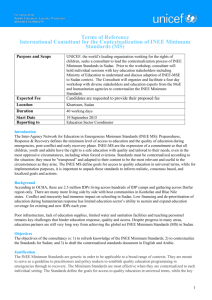
![View DRR Presentation Day 1 [PPT 1.07 MB]](http://s2.studylib.net/store/data/005562166_1-09058b36ec0804e4de33b95a0df46bfd-300x300.png)
